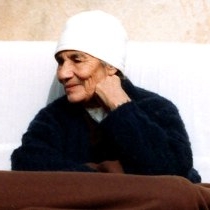Malak Jân Nemati
| Malak Jân Nemati | |
|---|---|
 |
|
| Born |
December 11, 1906 Jeyhounabad (Kermanshah Province), Iran |
| Died | July 15, 1993 (aged 86) Paris |
| Nationality | Kurdish |
| Other names | Sheikh Jâni, Saint Jani |
| Occupation | Author, Poet |
Malak Jân Nemati (or Malek Jân Nemati) was born in 1906 in Jeyhounabad, a village in Iranian Kurdistan. Also known as Sheikh Jâni and Saint Jani, she was a charismatic figure and a mystical writer and poet in Kurdish and Persian language. She was the daughter of Hajj Nematollah and the sister of Ostad Elahi. There are few written sources about her life. Some elements can be found in the words of her brother Ostad Elahi whom she was very close to. A biography in French was published on the occasion of the centennial of her birth, including the translation of some of her poems and sayings.
Malak Jan was born into a family belonging to the mystical order the Ahl-e Haqq (literally “Friends of the Truth”). Her father Hajj Nematollah was an outstanding spiritual personality who gave up a comfortable life a few years before she was born to devote himself to finding the Truth. So from a very early age, Malak Jan was initiated with the rest of her family to asceticism and prayer, but also and above all to ethical and spiritual reflection.
While in those days and in those remote regions of Kurdistan, new-born girls were greeted with condolences, it is noteworthy that Malak Jan received the same comprehensive education as her elder brother. With Kurdish as her mother tongue, she learned Persian and Arabic and set about studying the revealed books and the extremely rich Iranian poetry from which she would later draw her inspiration when writing her own poems. She was also given a musical education as she learned to play the tanbur (Kurdish lute accompanying Ahl-e Haqq sacred chants) and the setar (classical Persian lute). Hajj Nematollah was particularly fond of her. In keeping with his wish, she wore a white habit and bonnet “so that people could not tell whether it was a boy or a girl”. She actually wore that outfit throughout her life.
When she was fourteen, she had to suffer the grief of losing her father. Shortly afterwards, she experienced a painful ocular condition and by the age of twenty, she was completely and permanently blinded. The loss of her eyesight, though, seems to have coincided with the awakening of a form of mystical passion that led her to progressively draw closer to her brother Ostad Elahi and she became one of his most accomplished followers. When Ostad Elahi died, she quite naturally took up the torch of his spiritual teaching.
...
Wikipedia
